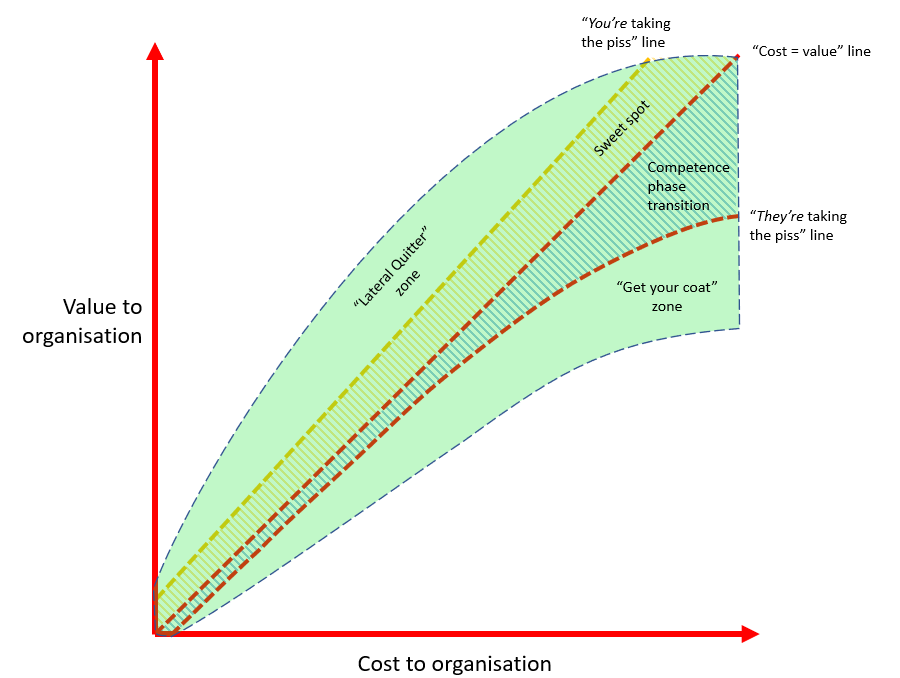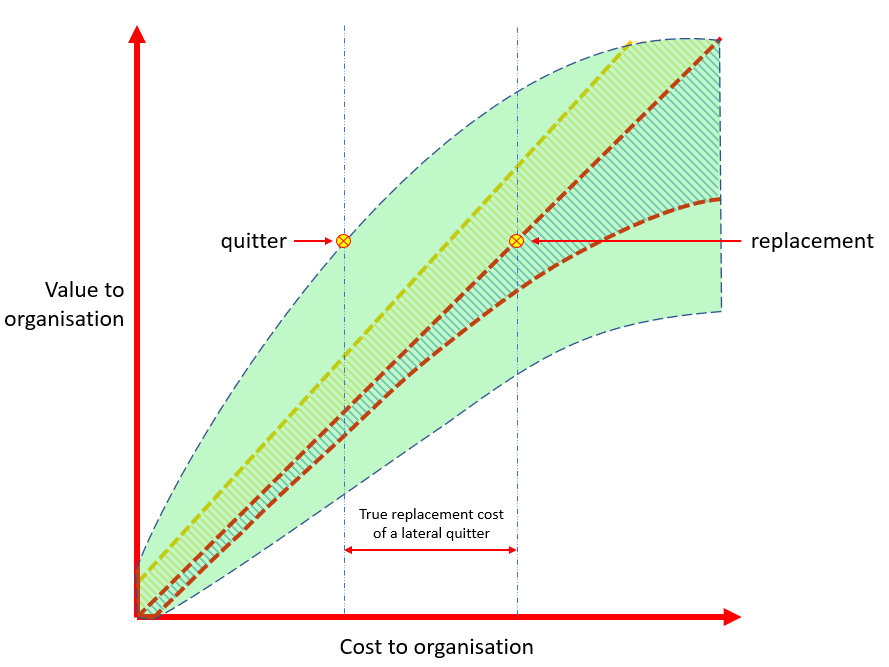Lateral quitter: Difference between revisions
Amwelladmin (talk | contribs) No edit summary Tags: Mobile edit Mobile web edit |
Amwelladmin (talk | contribs) No edit summary |
||
| Line 9: | Line 9: | ||
God speed all our friends in operation roles at DogeCoin and [[Lexrifyly]] right now, by the way: hope it is fun while it lasts. | God speed all our friends in operation roles at DogeCoin and [[Lexrifyly]] right now, by the way: hope it is fun while it lasts. | ||
===Lateral quitters are good staff=== | ===Lateral quitters are ''good'' staff, QED=== | ||
Anyway. Leaving aside these anomalous situations, lateral leavers will tend to be your ''better'' employees. Ones that provide more value than they cost. Being smart, they are likely to know they are being undervalued and, being proactive, energetic people, do something about it. By contrast, those who provide less value than they are worth are unlikely to do anything about it — especially if they are smart — and even the dumb ones who try to do something about it won’t be able to. | Anyway. Leaving aside these anomalous situations, lateral leavers will tend to be your ''better'' employees. Ones that provide more value than they cost. Being smart, they are likely to know they are being undervalued and, being proactive, energetic people, do something about it. By contrast, those who provide less value than they are worth are unlikely to do anything about it — especially if they are smart — and even the dumb ones who try to do something about it won’t be able to. | ||
| Line 15: | Line 15: | ||
Those who leave will be replaced — at necessarily greater cost, ''[[ceteris paribus]]'', because the one and only time you are obliged to [[mark to market]] is when you hire— by a person having , QED, no institutional knowledge, no network, and, even so, a no-better-than-even chance of working out well. | Those who leave will be replaced — at necessarily greater cost, ''[[ceteris paribus]]'', because the one and only time you are obliged to [[mark to market]] is when you hire— by a person having , QED, no institutional knowledge, no network, and, even so, a no-better-than-even chance of working out well. | ||
===The loyalty discount=== | ===The [[loyalty discount]]=== | ||
“But excellent employees will be rewarded with better pay and progression” is an objection only offered by someone who has not heard of the [[loyalty discount]]. [[HR]] will have forged ironclad compensation bands, based not | “But excellent employees will be rewarded with better pay and progression” is an objection only offered by someone who has not heard of the [[loyalty discount]]. [[HR]] will have forged ironclad compensation bands, based not on any assessment of the quality of the workforce (because how could HR, of all functions, possibly know?) but by some opaque benchmarking operation carried out by consultants “gathering data” from industry peers. Where exactly this data comes from, no-one will know. Assuming the consultants don’t just make it up out of whole cloth, assume it ''will be volunteered by other HR departments''. Now think for a moment, about interests here. If you were the highest payer on the street — therefore having a natural advantage over your peers in the lateral hire market — wouldn’t you want to keep ''quiet'' about that? Wouldn’t you be [[inclined to]] undercook the data you submitted to benchmark surveys? | ||
===Affirmative action | |||
But ''come on'' JC: surely, regulated institutions wouldn’t knowingly [[London Inter Bank Offered Rate|skew important market data to suit their own financial interests]], would they? | |||
Once they have successfully “benchmarked” their salary bands against the market, HR’s main concern will be ''not setting a precedent''. Your manager will shake his head mournfully and say, “my hands are tied.” | |||
===Affirmative action=== | |||
Notice another curious, unintended, negative feedback loop. Let’s say firms generally run a benign affirmative action policy. This means, all other things being equal, they will hire minority employees first, and clear out majority employees first in a [[RIF]]. | Notice another curious, unintended, negative feedback loop. Let’s say firms generally run a benign affirmative action policy. This means, all other things being equal, they will hire minority employees first, and clear out majority employees first in a [[RIF]]. | ||
Revision as of 12:13, 21 November 2022
|
Office anthropology™
|
Lateral quitter
ˈlætərəl ˈkwɪtə (n.)
One who voluntarily leaves your organisation to work somewhere else. Managers will steadfastly deny any lateral quitters are ever missed, but there are excel spreadsheets that will prove otherwise.
As a matter of logic, lateral quitters will tend to be good employees that you didn’t want to leave. Line managers have a remarkable facility, after the fact, for persuading their superiors, that this is not the case, but it stands to reason: if people leave who you wanted to leave anyway, you should have made them leave. Employment should not, however much human resources dogma implies otherwise, be a hostage situation. Either way.
The competence phase transition
Now, it is true: there is a sort of “bid/ask spread” between staff you genuinely value and those you would be just as happy never to see again. This we call the “competence phase transition”. It is a sort of purgatorial state, occupied by earnest plodders who don’t really earn their keep but do no real harm, such that you can’t quite summon the bureaucratic energy to proactively whack them, but few will shed crocodile tears if they did decide to push off. It is a remarkably stable state: staff of such a tepid bearing can comfortably inhabit this zone for decades. Some do, every now and then, have a rush of blood to the head and throw in the towel, often at times of mass exuberance: you know, dotcom booms, crypto mania, that kind of thing, when in a fit of irrational (and uncharacteristic) exuberance, these people join fly-by-night stablecoin start-ups and legaltech ventures. They are not generally heard of again until they show up in the fossil record as evidence of one of these mass extinctions that the financial service industry undergoes every decade or so.
God speed all our friends in operation roles at DogeCoin and Lexrifyly right now, by the way: hope it is fun while it lasts.
Lateral quitters are good staff, QED
Anyway. Leaving aside these anomalous situations, lateral leavers will tend to be your better employees. Ones that provide more value than they cost. Being smart, they are likely to know they are being undervalued and, being proactive, energetic people, do something about it. By contrast, those who provide less value than they are worth are unlikely to do anything about it — especially if they are smart — and even the dumb ones who try to do something about it won’t be able to.
There is a negative feedback loop here, therefore: say all people you hire have an equal chance of working out well — competence is evenly distributed — and those who work out better than expected are progressively more likely to quit while those who disappoint are progressively likely to stay. The competency of the workforce will quickly skew mediocre.
Those who leave will be replaced — at necessarily greater cost, ceteris paribus, because the one and only time you are obliged to mark to market is when you hire— by a person having , QED, no institutional knowledge, no network, and, even so, a no-better-than-even chance of working out well.
The loyalty discount
“But excellent employees will be rewarded with better pay and progression” is an objection only offered by someone who has not heard of the loyalty discount. HR will have forged ironclad compensation bands, based not on any assessment of the quality of the workforce (because how could HR, of all functions, possibly know?) but by some opaque benchmarking operation carried out by consultants “gathering data” from industry peers. Where exactly this data comes from, no-one will know. Assuming the consultants don’t just make it up out of whole cloth, assume it will be volunteered by other HR departments. Now think for a moment, about interests here. If you were the highest payer on the street — therefore having a natural advantage over your peers in the lateral hire market — wouldn’t you want to keep quiet about that? Wouldn’t you be inclined to undercook the data you submitted to benchmark surveys?
But come on JC: surely, regulated institutions wouldn’t knowingly skew important market data to suit their own financial interests, would they?
Once they have successfully “benchmarked” their salary bands against the market, HR’s main concern will be not setting a precedent. Your manager will shake his head mournfully and say, “my hands are tied.”
Affirmative action
Notice another curious, unintended, negative feedback loop. Let’s say firms generally run a benign affirmative action policy. This means, all other things being equal, they will hire minority employees first, and clear out majority employees first in a RIF.
Since you tend to laterally hire one at a time, but let employees go in large groups, and since minority employees are, by definition, a minority, this may have a powerful bias.
Predicated on three assumptions: that lateral quitters are generally good employees, redundancy candidates generally bad ones, and the individual abilities of all personnel, relative to their cost, are evenly distributed regardless of their majority/minority status. If so your “good section” will progressively become majority-dominated — they are not being bid away — and your “bad section” progressively minority dominated.
How your incoming lateral hires perform will remain to be seen, but since performance is relative to cost, and QED they are Your arriving at a higher cost than the ones you are replacing, they start not as outlier good staff, but average ones.
Look after what you have
If HR were worth the commodious space it occupied, it would ask who these lateral quitters are, and why, in general terms, they are walking away. On the other hand, it takes no towering intellectual insight to figure it out. In broad strokes it boils down to: money, progression, and quality of work.
Another way of looking at that continuum is this: you pay poor employees more than they are worth to you, and good employees ,less than than they are worth.
That they

